[日语学习]语法整理
日语语法知识点高中总结

日语语法知识点高中总结
动词的词干变化
在日本语中,动词的词干变化非常重要。
日语动词有五种词干:ます、て、た、ない、命令形。
这五种词干分别对应不同的时态和语态,如表达过去时、进行时、否定形、命令形等。
对于初学者来说,理解和掌握这些词干的变化规则是至关重要的。
形容词和形容词的用法
形容词在日语中有着特殊的用法。
形容词可以在句子中充当主语、谓语或宾语,而且形容词的用法还与名词的连用、修饰等有着密切的关系。
因此,初学者需要清楚形容词的各种用法,以便正确地运用于句子中。
助词的用法
助词在日语中扮演着非常重要的角色,它们不仅可以用来表达语气、做出疑问、表达否定等,还可以帮助区分句子中的主语、宾语、谓语等。
因此,初学者需要认真学习各种助词的用法,并且灵活地运用于句子中。
复合句的构造
日语中的复合句构造有着复杂的规则,初学者需要了解并掌握各种连接词、从句的结构和用法,以便正确地构造复合句。
动词的使役形和被动形
在日语中,动词除了基本的时态和语态外,还有使役形和被动形。
使役形表示主语让别人做某事,而被动形表示主语被动地做某事。
初学者需要熟练掌握这两种形式的变化规则,以便正确地使用于句子中。
以上是关于日语高中语法知识点的总结,希望能对大家的学习有所帮助。
日语语法是一个非常广阔和深奥的领域,需要我们不断地学习和实践才能够真正掌握。
希望大家可以坚持学习,不断提高自己的语言能力。
日语高考知识点语法总结

日语高考知识点语法总结一、动词词干与词尾的规则日语动词的词干是指动词的词干部分,而词尾是指动词末尾的部分。
动词的词干和词尾会根据不同的情况发生变化。
1. 动词的词尾变化规则日语动词的词尾会根据不同的时态、语气、句子结构等而发生变化。
例如,在敬体中,常见的动词词尾包括ます、ました、ません等;在普通体中,动词词尾可能有ます、ました、ません、る、た、ない等等。
2. 动词的词干变化规则在日语中,有五段动词和一段动词,它们的词干变化规则略有不同。
在五段动词中,词干会根据不同的时态、语气等发生不同的变化。
例如,在命令形中,五段动词会把词干的る变为れ,再加上规则动词词尾,从而得到命令形式。
而一段动词的变化相对简单一些。
二、助动词的使用在日语中,助动词的使用十分普遍。
助动词可以用来表示不同的时态、语气、句子结构等。
1. 表示把动作发生在先的助动词‘ている’‘ている’是一个表示动作已经发生的助动词。
它通常用来表示正在进行的动作或者状态。
例如,‘走っている’表示正在走,‘食べている’表示正在吃。
2. 表示过去的助动词‘た’‘た’是一个表示动作发生在过去时的助动词。
它通常用来表示已经完成的动作。
例如,‘見た’表示看过。
3. 表示意向的助动词‘つもり’‘つもり’是一个表示意向或打算的助动词。
它通常用来表达说话者将要做某事的打算。
例如,‘日本に行くつもりです’表示将要去日本。
4. 表示请求或命令的助动词‘てください’‘てください’是一个表示请求或命令的助动词。
它通常用来对别人提出请求或命令。
例如,‘手紙を書いてください’表示请写信。
三、形容词和形容动词在日语中,形容词和形容动词可以用来修饰名词或者代词。
它们的使用规则也略有不同。
1. 形容词的使用形容词可以直接修饰名词或代词。
例如,‘きれいな花’表示漂亮的花。
2. 形容动词的使用形容动词在修饰名词或代词时通常会在后面加上‘な’。
例如,‘便利な店’表示便利的店。
四、副词副词是用来修饰动词、形容词或者其他副词的词语。
日语语法及其例句整理

新编日语语法索引(1-3册)第一册第三课へや1、××は**にあります/います。
该句型表示“××(什么东西)在**(某处)。
”e.g:わたしの部屋(へや)は一階(いっかい)にあります。
(我的房间在一楼。
)e.g:彼(かれ)は部屋にいます。
(他在房间里面。
)2、**に××があります/います。
该句型表示“**(某处)有××(什么东西)。
”e.g:部屋に床があります。
(房间里面有床。
)初看大家也许会有些和上面的混淆,但是只要注意到一点,就可以很好的区分开来了。
这个关键就在于格助词に,に通常表示的是地点,所以前面的就一定会是**(某处)。
所以这个句型只是把前面那个句型中的“**に”提到了句前,而が作为格助词,根据“が前は后”的口诀,が强调的是前面的部分,所以该句型和句型一几乎可以说是描述同一个事情,但是区别就在于这个句型是在说明:这个地方有××,别的东西也许也有,但是说话人不打算提其它的。
补充知识点:3、**は××があります/います。
该句型表示的是,“**有××。
”该句型和上面的句型二相比,只是把に换成了は,虽然意思可以翻译成是**有××(什么东西)。
但是**不仅仅只是表示地点的词,也可以是其它的。
e.g:わたしは新编日语と言う本があります。
(我有新编日语这书。
)若是ここ/そこ/あそこは××があります/います。
则相当于英语的“Here/there is ××。
”所以可以看出,该虽然依然可以翻译成“**有××(什么东西)”,但更多的是在表示“拥有”的意思,强调的是动作,而不是句型一和二所表示的客观存在着“有”。
在该句型中,还要注意一点,若是要表示,“某人有兄弟姐妹”之类的意思,那么是用あります。
精要:日语学习基本语法总结

「によっては」与「によって」不同在于它强调的是个别,不是一般情况。表是[由于…不同…] [有时候…] [有的地方…] [某些…]。
* その話を聞けば、人によっては怒るかもしれない。(听了这话,有的人也许会生气。)
1、どんなに…か
「どんなに…か」表示感叹,一般用于书面语。
5、どうやら…らしい(ようだ)
副词「どうやら」表示[仿佛] [多半]等意思,常和「らしい」「ようだ」「そうだ」等表示推量的助动词呼应使用。
*どうやら君は僕より日本語になれるのが早かったみたいだね。(你好象比我快地习惯了日语的表达方式。)
6、(た)かと思うと
8、…までもない
「まで」表程度。「までもない」接在动词连体形下面,表示事情尚未达到「まで」前面动词所表示的程度。[不必…] [用不着…] [无须…]。
*こんな小さな事は院長に報告するまでもありません。(这点小事无须向院长报告。)
9、…とされている
「とされている」是词组「とする」的被动态,表示一般所公认的事实。
1、…ないで(なくて)すむ
这个句型表示[用不着…也行] [不…也可以]。
*買わないですむなら買わないでください。(如果不买也可以的话,那就请别买。)
2、…と比較にならない
表示由于两者相差太大而不能放在一起比。
*私の苦労などあなたたちとは比較になりません。(我的辛苦和你们不能比。)
c、表示浇(水)等。--->ちょっと味が薄いから、ソースでもかけましょうか。(味道有点儿淡,浇点辣酱油吧。)
d、表示花时间或金钱。--->二週間もかけてこのレポートを書きました。(花了两个星期写成了这篇学习报告。)
日语语法大全整理笔记
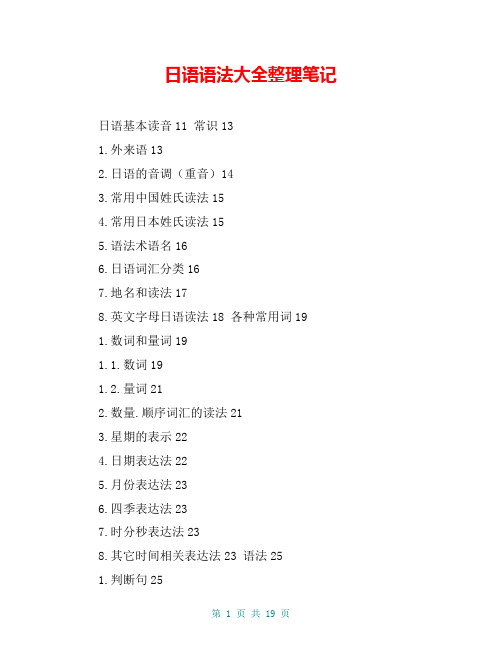
日语语法大全整理笔记日语基本读音11 常识131.外来语132.日语的音调(重音)143.常用中国姓氏读法154.常用日本姓氏读法155.语法术语名166.日语词汇分类167.地名和读法178.英文字母日语读法18 各种常用词191.数词和量词191.1.数词191.2.量词212.数量.顺序词汇的读法213.星期的表示224.日期表达法225.月份表达法236.四季表达法237.时分秒表达法238.其它时间相关表达法23 语法251.判断句251.1.基本句型(肯定式)251.2.过去肯定式251.3.否定式251.4.过去否定式251.5.将来推测式261.6.疑问式261.7.特殊疑问式261.8.中顿式262.存在句272.1.存在动词的含义272.2.存在动词的分工272.3.存在句句型272.3.1.表示“有”含义的基本句型282.3.2.表示“在“含义的基本句型283.愿望句式283.1.(第一人称 + は)...が/を...たいです。
/(第一人称)想 (28)3.2.(第一人称 + は)...が/を...たいと思います。
/(第一人称)想 (28)3.3.(第一人称 + は)...を...う/ようと思います。
/(第一人称)想要 (28)4.形容词294.1.词形特征294.2.词尾变化294.2.1.连用形294.2.2.终止形294.2.3.连体形304.2.4.假定形304.2.5.推量形304.3.形容词的简体与敬体305.形容动词315.1.词形特征315.2.词尾变化(活用)315.2.1.连用形315.2.2.终止形315.2.3.连体形315.2.4.假定形325.2.5.推量形325.3.判断助动词[だ]与形容动词词尾[だ]325.4.形容动词的简体.敬体及其应用326.动词336.1.动词分类336.1.1.按活用形式分类336.1.1.1.五段活用动词336.1.1.2.一段活用动词336.1.1.3.カ行变格活用动词346.1.1.4.サ行变格活用动词346.1.2.按语法作用分类346.2.动词的活用形346.2.1.动词的终止形346.2.2.动词的连体形356.2.3.动词的连用形356.2.3.1.五段动词的连用形356.2.3.2.一段动词的连用形356.2.3.3.カ行变格活用动词的连用形35 6.2.3.4.サ行变格活用动词的连用形36 6.2.3.5.五段动词的音便形366.2.4.动词的未然形376.2.4.1.五段活用动词的未然形376.2.4.2.一段活用动词的未然形376.2.4.3.カ行变格活用动词的未然形37 6.2.4.4.サ行变格活用动词的未然形38 6.2.5.动词的假定形386.2.6.动词的命令形386.2.6.1.五段动词的命令形386.2.6.2.一段动词的命令形396.2.6.3.カ变动词的命令形396.2.6.4.サ变动词的命令形396.2.7.动词的推量形及推量助动词(う·よう)396.2.7.1.五段动词的推量形406.2.7.2.一段动词的推量形406.2.7.3.カ变动词的推量形406.2.7.4.サ变动词的推量形406.3.授受关系动词及其用法406.3.1.授受关系动词416.3.2.授受关系动词构成的补助动词句426.3.3.授受关系三原则426.4.动词的使役态.使役助动词「5.6.5. せる·させる」5.6.6. .使役句436.5.动词的被动态及被动助动词(れる·られる)44 a.被动句的基本句型:45 b.被动句的扩展句型45 a)处理双宾语句45 b)处理汉语“…的…”结构456.6.可能态及可能动词46 a. 动词原形 + ことができる46b. 动词未然形 + [れる|られる]46c. 五段动词词尾「う」段假名→「え」段假名 + る46d. サ变动词词干 + できる477.助词.助动词477.2.提示助词[も]477.3.助词[が]477.3.1.主格助词[が]487.3.2.格助词[が]487.3.3.接续助词[が]487.4.领格助词[の]487.5.终助词[か]487.6.接续助词[て]497.7.提示助词[は]497.8.接续助词[から]497.9.补格助词[より]497.10.副助词[ほど]497.11.终助词[ね][よ]497.12.传闻助动词[そうだ]50 7.13.补格助词[に]507.14.副助词[か]507.15.并列助词[と]507.16.副助词[や]517.17.位格[の]517.18.敬体助动词[ます]51 7.19.宾格助词[を]527.21.过去完了助动词[た]52 7.21.1.[た]的终止形527.21.2. [た]的连体形537.21.3. [た]的假定形[たら]53 7.22.接续助词[て]537.23.补助动词[て]537.23.1.补助动词[ている]54 7.23.2.补助动词[てみる]54 7.24.接续助词[と]547.25.补格助词[に]547.26.补格助词[から]557.27.否定助动词[ない]557.27.1.连用形557.27.2.连体形557.27.3.终止形567.27.4.假定形567.27.5.推量形567.28.判断助动词「5.7.31.である」5.7.32.567.29.补格助词[と]577.30.补助动词「(て)いく,(て)しまう」577.30.1.…(て)いく577.30.2.…(て)しまう577.31.表示假定的助词及助动词「ば/と/なら/たら」58 7.31.1.接续助词「ば」587.31.2.接续助词「と」587.31.3.助动词「なら」587.31.4.助动词「たら」597.32.否定助动词「ぬ(ん)」597.33.样态助动词「そうだ」607.34.补格助词「まで」607.35.副助词「だけ」607.36.副助词「でも」607.37.接续助词「のに」617.38.补助动词「(て)くる/(て)おる」617.38.1.…(て)くる617.38.2.…(て)おる617.39.愿望助动词「たい」617.40.助词「を」627.41.副助词「くらい/ぐらい」627.42.复合助词「までに」637.43.补格助词「で」637.44.补格助词「と」637.45.终助词「な」637.46.补助动词「(て)ある」637.47.表示时间点概数的「ころ/ごろ」647.48.补助动词「(て)おく」647.49.补格助词「に」647.50.样态助动词「ようだ」647.51.副助词「ほど」657.52.副助词「さえ」657.53.接续助词「ながら」657.54.接续助词「ので」667.55.并列助词「し」667.56.接续助词「きり」667.57.补格助词「へ」678.敬语678.1.专用敬语词汇678.1.1.专用尊敬语词汇及其用法678.1.2.专用自谦词汇及其用法688.2.非专用敬语词汇的构词形式698.2.1.非专用尊敬语词汇的构词形式及其用法698.2.2.非专用自谦语词汇的构词形式及其用法708.3.其它敬语形式:708.3.1.借用被动助动词「れる·られる」构成尊敬语形式708.3.2.借用「いただく」或「願う」构成自谦句式70 日语基本句型721.…は…です722.…は…ですか723.…はなんですか724.…は…にあります725.…は…にいます726.…に…が(も)あります727.…に…がいます738.…には…があります739.…には…はありません7310.…に…がいくつありますか7311.…や…など7312.…は…ではありません7313.…を…7414.体言词) + になる7415.…は…が…7416.BよりAのほうが…です7417.AはBより…です7418.…う(よう)と思(おも)います(第一人称)7419.用言(动词)连体形 + のです7520.…つもりです7521.定语 + ために7522.…は…と言(げん/こと)います7523.…は(…に)…と言います7624.…を…と言います7625.…へ…を…に行きます(来ます)7626.…ばいい(よい)7627.…と思います7628.…(する)前(まえ)に7729.…でしょう7730.あまり…ない7731.…より…のほうが…7732.…や…や…など7733.疑问词 + も…否定式7834.…も…も7835.…(の)ために7836.…ことにしました7837.…しか…ない7838.…つもりです7839.…ながら7940.…感(かん)じがする7941.…たり…たりする7942.…のまま7943.…としたら7944.…のです8045.…によって/…による8046.…前(に)8047.…と…(と)では,(どちら)が…8048.疑问词 + も8149.…ても8150.…ように8151.…なければならない8152.…にとって8153.…として8254.…一方8255.…てはならない8256.けっして…ない8257.…ことができる8358.…(た)ことがある8359.…に対して8360.…ことになる8361.たとえ…にしろ8362.…ないといけない8463.…より…(の)方が…8464.…てこそ8465.…てください8466.…(する)ことがある8467.…かもしれない8568.…てはいけない8569.…ことになる8570.…がする8571.…たまま8672.…たびに8673.…てから8674.…(を)手に入れる。
日语100个基本语法

日语语法1~ます、~ました、~ません、~ませんでした、动词+ます、名词、形容词+です2.名词(时)+に在表示时间的名词后面接助词“に”,表示动作进行的时间不以数字表示的时间不用接“に”。
注意:助词“に”后面必须接动词,不能直接接“です”。
3.名(场所)+ヘ行きます去~来ます来到~帰ります回~当谓语表示向某一地点移动的动词时,用表示场所的名词接助词“ヘ”来表示其移动的方向。
4.疑问词+も~ません表示全面否定疑问词代表范围内的事物。
疑问词:どこ(ヘ)、だれ、なに等5.名词+を+他动词助词“を”表示他动词得目的或对象。
6.名(场所)+で表示动作的场所。
7.“なん”和“なに”(1)后面所接单词的第一个发音为“た”、“だ”、“な”行时,用“なん”(2)后面接量词或相当于量词的词汇时,用“なん”(3)除(1)、(2)外,用“なに”8.动词+ませんか9.动词+ましょう在积极劝诱及邀请积极响应时使用。
例:ロビーで休みましょう。
10.名(工具、手段)+で表示动作的手段和方法。
例:はしでごはんを食べます。
11.名(交通工具)+で乘~表示交通手段和方法。
例:電車で行きます。
12.(1)名(人、公司、国家等)+に+名+をあげます给~貸します借~書きます给~写~かけます等给~打~表示给与对方~。
例:会社に電話をかけます。
(2)名(人、公司、国家等)+に+名+を習います从~学习~からもらいます等从~得到~表示事物及信息的出处。
例:わたしは会社から時計をもらいました。
13.もう:表示“已经~”的意思。
まだ:表示“还没有~”的意思。
注意:“まだ”的句子谓语不能使用表示过去了的事情的动词。
14.い形容词(い形)全部以“い”结束(“い”前面音节为“あ段”、“い段”、“う段”、“え段”、“お段”的音)15.な形容词(な形)以“い”以外的音,或“え段”的音加“い”结束。
例:静かな、有名な、きれいな、嫌いな16.形容词做谓语的用法(1)非过去肯定:“い形”不发生词尾变化,“な形”省略“な”。
日语n1语法总结

日语n1语法总结日语N1语法总结(1000字)日语N1考试是日本国内最高级别的日语能力考试之一,要求考生具备高级的语法知识和应用能力。
N1语法的总结如下:一、句型结构N1语法要求考生能够掌握各种复杂的句型结构,包括主谓宾结构、主谓祈使结构、循环结构、转折结构、假设结构、条件结构等等。
考生需要正确运用这些结构,使句子表达准确、流畅。
二、副词、形容词的用法N1语法要求考生能够正确使用各种副词和形容词,比如副词的位置、用法和含义,形容词的变形规则,以及不同形容词的用法和含义。
三、动词、名词、形容词的用法N1语法要求考生具备较高的动词、名词和形容词的词汇量,并能够正确使用它们。
考生需要掌握不同动词的用法、变形规则和意义,以及名词的用法和词义辨析,形容词的用法和变形规则。
四、复合句的用法N1语法要求考生能够正确运用复合句的各种结构和连接词,比如并列句、递进句、选择句、因果句、转折句等等。
考生需要掌握不同种类的复合句结构,并能够正确运用它们。
五、上位关系、下位关系的表达N1语法要求考生能够正确表达上下位关系,比如一般名词和具体名词之间的关系,抽象名词和具体名词之间的关系,动词和名词之间的关系等等。
考生需要掌握不同种类的上下位关系的表达方式,并能够正确运用它们。
六、语气的表达N1语法要求考生能够正确表达不同的语气,比如命令语气、建议语气、推测语气、推理语气等等。
考生需要掌握不同语气的表达方式,并能够正确运用它们。
七、各种句子的转换N1语法要求考生能够将不同的句子进行转换,比如主动态句转被动态句、直接引语转间接引语、肯定句转否定句等等。
考生需要掌握各种句子转换的规则,并能够正确运用它们。
八、常用句型的运用N1语法要求考生能够熟练运用各种常用句型,比如感叹句、条件句、假设句、让步句等等。
考生需要掌握常用句型的用法,并能够正确运用它们。
以上是N1语法的总结,考生需要认真学习掌握这些语法知识,并通过大量练习提高应用能力。
日语基础语法(完整篇)
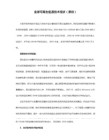
④ 雨が降っても明日の運動会は続けます。“即使明天下雨,运动会继续进行。”
⑤ いくら勉強したって、良い成績が取れない。“怎么学习,也不能取得好成绩。”
⑤雨がふるとて、訓練は続ける。“即使下雨,训练继续进行。”
⑥ 春になると、花が咲く。“一到春天,花就开了。”
⑦ 王さんが行くなら、私も行く。“如果小王去,那么我也去。”
⑧ いかにできるとも、油断は大敵だ。“即使再能干,麻痹大意是大敌。”
c、副助词:
①日曜日に王さんが来るかどうかわからない。 “我不知道星期日小王来不来。”
③ 先生が説明をし、皆は分かりました。“因为老师进行了说明,所以大家都明白了。”
④ 林さんが来、とても賑やかになりました。(一般用来て)“因为小林来了,所以变得非常热闹起来。”
C,名词法:一些动词连用形=表示动作的名词
a,单独的名词
① 変なことを言って笑いの種になりました。“说了不得体的话,被人当成了笑料。”
② 悪いと知りつつ、返事を出さない。“明知不对,但是就是不回信。”
③ 世の中は持ちつ持たれつである。“人间是相互支持的。”
④ 出来るかどうかは私のやり次第である。“能否成功就看我的劲头了。”
F,部分助词的要求:连用形+て、たり、たら、ても、たって(五段动词音变浊化)
① 町へ行って買い物をする。“上街去买东西。”
② ご飯を食べ、お茶を飲んだ。“吃饭(后)喝茶。”
③ ラジオ体操をし、ジョキングをした。“作广播操,再慢跑。”
标准日本语语法总结

标准日本语语法总结标准日本语语法总结日本语是一种以层次分明的谓宾结构为基础的语言,具有独特的语序和语法规则。
下面将对标准日本语的语法进行总结,以帮助学习者更好地掌握这门语言。
1. 名词的用法名词在句子中可以作为主语、宾语、补语等成分。
名词之间通常可以通过助词连接,如「と」表示和、「や」表示和、等等。
另外,还有一些特殊的名词用法,如:量词后面使用名词表示数量、名词后面添加「の」表示所属关系等。
2. 动词的用法日语的动词包括五段动词和一段动词。
动词的各种形式在句子中有不同的作用,如:连体形用于形容词、名词修饰等,连用形用于动词的连接等。
动词还可以通过添加助词、助动词等来表达各种语态、时态、否定等。
3. 形容词的用法形容词的用法和动词比较类似,也有各种形式来表示不同的作用。
形容词一般可以直接修饰名词,与名词之间直接相连。
另外,形容词也可以通过添加助词、助动词等来表达各种语态、时态、否定等。
4. 副词的用法副词主要用来修饰动词、形容词、副词等,表达程度、方式、地点等不同的意义。
副词的用法相对灵活,可以直接放在所修饰的词的前面或后面。
另外,副词也可以通过添加助动词或助词来表达不同的语态、时态、否定等。
5. 助词的用法助词在日语句子中起到连接句子成分的作用,使句子的结构更加完整清晰。
不同的助词有不同的作用,如「は」表示主题、「が」表示主语、「を」表示宾语等。
助词的位置比较固定,一般跟在相应的名词或动词后面。
6. 句型的用法日语有特定的基本句型,如:主语+谓语、主语+形容词、主语+助动词+动词等。
根据句型的不同,可以通过增加副词、助词、助动词等来丰富句子的含义和表达方式。
7. 时态和语态的用法日语有时态和语态的变化,可以通过动词和助动词的变化来表示不同的时间和语态。
如动词的过去时态通过将词尾的「る」变为「た」,将「ます」变为「ました」等。
8. 数量词和计量的用法日语有丰富的数量词和计量的表达方式。
数量词可以直接放在名词后面表示数量,也可以通过助词「の」连接在名词后面。
日语语法
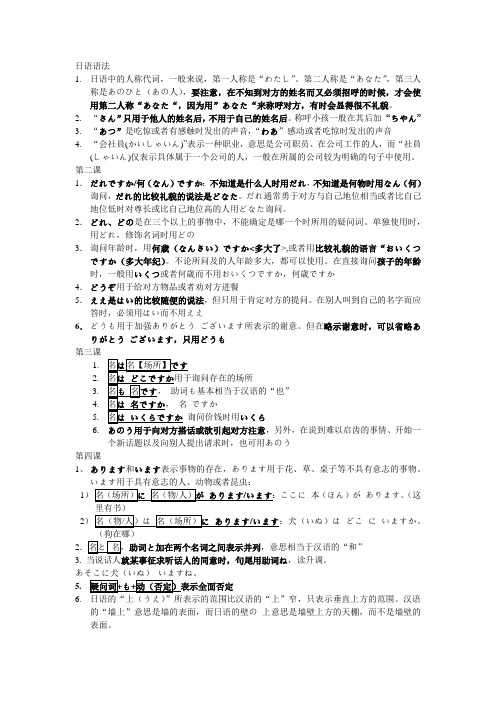
日语语法1.日语中的人称代词,一般来说,第一人称是“わたし”。
第二人称是“あなた”,第三人称是あのひと(あの人),要注意,在不知到对方的姓名而又必须招呼的时候,才会使用第二人称“あなた“,因为用”あなた“来称呼对方,有时会显得很不礼貌。
2.“さん”只用于他人的姓名后,不用于自己的姓名后。
称呼小孩一般在其后加“ちやん”3.“あつ”是吃惊或者有感触时发出的声音,“わあ”感动或者吃惊时发出的声音4.“会社員(かいしゃいん)”表示一种职业,意思是公司职员、在公司工作的人,而“社員(しゃいん)仅表示具体属于一个公司的人,一般在所属的公司较为明确的句子中使用。
第二课1.だれですか/何(なん)ですか:不知道是什么人时用だれ,不知道是何物时用なん(何)询问,だれ的比较礼貌的说法是どなた。
だれ通常勇于对方与自己地位相当或者比自己地位低时对尊长或比自己地位高的人用どなた询问。
2.どれ、どの是在三个以上的事物中,不能确定是哪一个时所用的疑问词。
单独使用时,用どれ,修饰名词时用どの3.询问年龄时,用何歳(なんさい)ですか<多大了>,或者用比较礼貌的语言“おいくつですか(多大年纪)。
不论所问及的人年龄多大,都可以使用。
在直接询问孩子的年龄时,一般用いくつ或者何歳而不用おいくつですか,何歳ですか4.どうぞ用于给对方物品或者劝对方进餐5.ええ是はい的比较随便的说法,但只用于肯定对方的提问。
在别人叫到自己的名字而应答时,必须用はい而不用ええ6.どうも用于加强ありがとうございます所表示的谢意。
但在略示谢意时,可以省略ありがとうございます,只用どうも第三课1.2.3.4.ですか5.いくら6.あのう用于向对方搭话或欲引起对方注意,另外,在说到难以启齿的事情、开始一个新话题以及向别人提出请求时,也可用あのう第四课1、あります和います表示事物的存在,あります用于花、草、桌子等不具有意志的事物。
います用于具有意志的人、动物或者昆虫:1本(ほん)があります。
日语基础语法整理
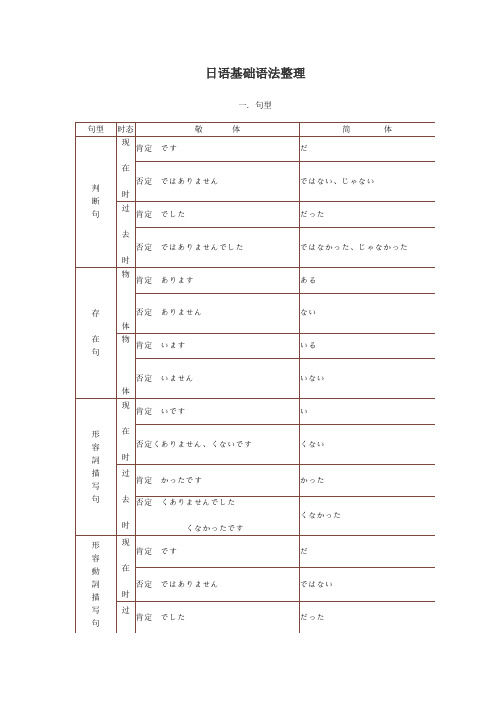
日语基础语法整理
一. 句型
二、动词活用表
各活用形的用法:
1.未然形:接续助动词ない表示否定。
•私は朝ご飯を食べない。
我不吃早餐。
2.连用形:连接其他用言或助动词ます、て、助词た等表示动作的情况。
•私は朝ご飯を食べます。
我吃早餐。
•私は味噌汁(みそしる)を飲んで、朝ご飯を食べます。
我喝了酱汤后,再吃早餐。
•私は昨日寿司(すし)を食べた。
我昨天吃了寿司。
3.终止形:以动词做谓语,直接用于结束句子,构成简体。
也就是”基本形”。
•私は朝ご飯を食べる。
我吃早餐。
4.连体形:连接修饰体言。
形式上和终止形一样。
•私が食べる朝ご飯はパンです。
我吃的早餐是面包。
5.假定形:连接助词ば表示假定。
•あなたが朝ご飯を食べれば、私も食べる。
如果你吃早餐,那我也吃。
6.命令形:表示命令的语气时使用。
•朝ご飯を食べれ。
快吃早餐!
7.推量形:连接助动词う、よう表示推测或个人意志、决心。
•お腹(なか)が空(す)いているから、朝(あさ)ご飯(はん)を食(た)べよう。
肚子饿了,吃早餐吧。
三、常用助词用法。
日语知识点总结归纳本

日语知识点总结归纳本一、日语的基本语法日语的基本语法是主语-谓语-宾语的结构,与汉语有一些相似之处。
但是日语的词序是“主谓宾”的倒装结构,所以有时候我们听到日本人说话会有一些不太习惯的感觉。
另外,日语中还有一些特殊的动词形态和助动词的使用方法,需要我们特别注意和练习。
二、日语的敬语在日语中有许多种敬语,包括严谨的敬语、尊敬的敬语、谦虚的敬语等等。
这些敬语在不同的场合和对不同的人使用,需要我们掌握并恰当地运用。
例如,对长者、上司、客户等需要使用尊敬的敬语,而对朋友、家人等则可以使用比较随意的敬语。
三、学习日语中的假名和汉字在日语中有假名和汉字两种文字,假名主要用来书写助动词、辅助的语气词和一些外来语等,而汉字则是来自中国的文字,用来书写名词、动词、形容词等。
学习日语中的假名和汉字是非常重要的,因为只有掌握了这两种文字,我们才能够真正理解和运用日语。
四、日语的动词和形容词变化日语中的动词和形容词有非常多的变化形式,包括肯定形、否定形、过去形、将来形、命令形等等。
这些变化形式需要我们通过不断地练习和积累才能够熟练地掌握。
另外,有一些特殊的动词和形容词变化形式,需要我们特别留意。
五、学习日语中的名词和量词日语中有很多的名词和对应的量词,比如“本”、“冊”、“杯”、“個”等等。
这些量词和名词的搭配需要我们特别注意和记住,不同的量词对应不同的名词,有时候一个名词对应多个不同的量词,需要我们多加练习和积累。
六、日语的时态和语气在日语中有多种时态和语气,包括过去时、现在时、将来时,以及肯定、否定、疑问等等。
这些时态和语气需要我们特别留意并积累,因为在实际的交流中,时态和语气的使用会影响到我们表达的准确性和流畅度。
七、日语中的副词和连词副词和连词在日语中起着非常重要的连接作用,它们可以连接两个句子或者两个词语,使得整个句子更加流畅和连贯。
而且,副词还可以修饰动词、形容词和其他副词,使得句子更加生动和具体。
在学习日语的过程中,需要我们认真积累副词和连词的用法,并多加练习。
日语语法大全
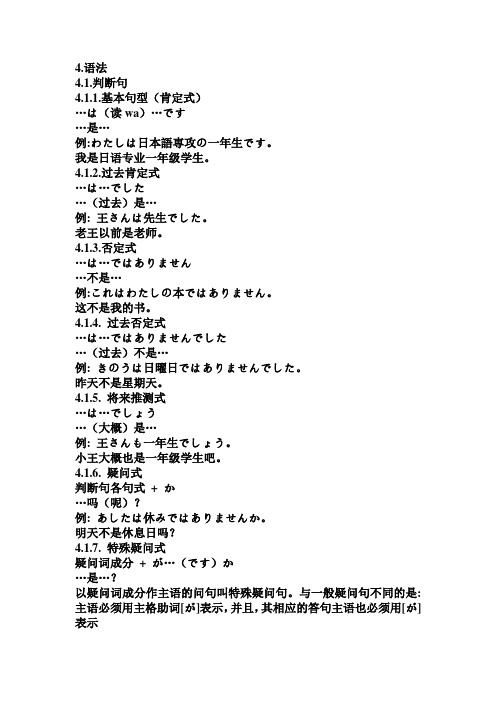
4.语法4.1.判断句4.1.1.基本句型(肯定式)…は(读wa)…です…是…例:わたしは日本語専攻の一年生です。
我是日语专业一年级学生。
4.1.2.过去肯定式…は…でした…(过去)是…例: 王さんは先生でした。
老王以前是老师。
4.1.3.否定式…は…ではありません…不是…例:これはわたしの本ではありません。
这不是我的书。
4.1.4. 过去否定式…は…ではありませんでした…(过去)不是…例: きのうは日曜日ではありませんでした。
昨天不是星期天。
4.1.5. 将来推测式…は…でしょう…(大概)是…例: 王さんも一年生でしょう。
小王大概也是一年级学生吧。
4.1.6. 疑问式判断句各句式+ か…吗(呢)?例: あしたは休みではありませんか。
明天不是休息日吗?4.1.7. 特殊疑问式疑问词成分+ が…(です)か…是…?以疑问词成分作主语的问句叫特殊疑问句。
与一般疑问句不同的是:主语必须用主格助词[が]表示,并且,其相应的答句主语也必须用[が]表示例: だれが小林さんですか。
---> わたしが小林です。
谁是小林?---> 我就是小林。
4.1.8. 中顿式…で,…(です)…是…,(是)…一句话中间停顿打逗号时,[です]要用其中顿形式[で]例: これはクラスの新聞で,先生のではありません。
这是班里的报纸,不是老师的4.2. 存在句以存在动词[ある、いる、(おる)]作谓语的句子叫作存在句。
存在动词的敬体形式为[あります、います]4.2.1. 存在动词的含义存在动词具有“有”和“在”两种含义。
含义的区分,主要取决于动词前的助词,基本规律为:…があります(、います)/…有……にあります(、います)/…在…例: 庭があります。
/有(一个)院子。
庭にあります。
/在院子里。
4.2.2. 存在动词的分工存在动词[あります]和[います(おります)]分别用于不同场合,具体分工如下:あります——用于表示事、物います——用于表示人、动物おります——用于表示第一人称及相关场合,含自谦语气例: きょう映画があります。
日语学习-(完整)日语语法大全整理笔记之目录,推荐文档

(完整)日语语法大全整理笔记之目录,推荐文档日语语法大全整理笔记之目录1?日语基本读音2?常识1. 外来语2. 日语的音调(重音)3. 常用中国姓氏读法4. 常用日本姓氏读法乞语法术语名称6. 日语词汇分类7. 地名的读法8. 英文字母日语读法3?各种常用词1数词和量词1.1. 数词1.2. 量词2. 数量、顺序词汇的读法3. 星期的表示4. 日期表达法5. 月份表达法 6. 四季表达法7. 时分秒表达法8. 其它时间相关表达法3.1. (第一人称+ "比)…力* /总…尢/(第一人称)想….......................3.2. (第一人称+ "比)…力* /总…尢「、七思「、去歹。
/ (第一人称)想…3.3. (第一人称+ 0弍)…花…刁/七思「、未丁。
/(第一人称)想4.形容词4.1.词形特征4语法1. 判断句1.1. 1.2. 1.3. 1.4. 1.5. 1.6. 1.7. 1.8. 2. 存在句2.1. 2.2. 2.3.3. 愿望句式基本句型(肯定式)过去肯定式否定式过去否定式将来推测式疑问式特殊疑问式中顿式存在动词的含义存在动词的分工存在句句型4.2. 词尾变化4.3. 形容词的简体与敬体5. 形容动词5.1. 词形特5.2. 词尾变化(活用)5.3. 判断助动词[疋]与形容动词词尾[疋]5.4. 形容动词的简体、敬体及其应用6. 动词6.1. 动词分类6.2. 动词的活用形6.3. 授受关系动词及其用法6.4. 动词的使役态、使役助动词「乜」、使役句6.5. 动词的被动态及被动助动词「料料召」6.6. 可能态及可能动词7. 助词、助动词7.1. 提示助词[总]7.2. 提示助词[哲]7.3. 助词[力* ]7.4. 领格助词[①]7.5. 终助词[力、]7.6. 接续助词[疋]7.7. 提示助词[总]7.8. 接续助词[力、5 ]7.9. 补格助词[]7.10. 副助词[些]7.11. 终助词[相][/ ]7.12. 传闻助动词[㈠吃]7.13. 补格助词[]7.14. 副助词[力、]7.15. 并列助词[七]7.16. 副助词[壬]7.17. 同位格[①]7.18. 敬体助动词[去歹]7.19. 宾格助词[总]7.20. 宾格助词[]7.21. 过去完了助动词[尢]7.22. 接续助词[疋]7.23. 补助动词[疋]7.24. 接续助词[七]7.25. 补格助词[]7.26. 补格助词[2 ]7.27. 否定助动词「肚X」7.28. 判断助动词「笳召丨7.29. 补格助词「七」7.30. 补助动词「(疋」、「(疋)0去刁」7.31.7.32.表示假定的助词及助动词「f?七?肚5 ?尢5」否定助动词「空(人)」7.33.7.34.7.35.7.36.7.37.样态助动词「㈠吃」补格助词「去副助词「粉」副助词「」接续助词「7.38.7.39.补助动词「(疋)」、「(疋)指召」愿望助动词「尢X」7.40.7.41.7.42.助词「总」副助词「7.43.7.44.补格助词「补格助词「七」7.45.7.46.7.47.终助词「肚」补助动词「(疋)笳召」表示时间点概数的「」7.48.7.49.补助动词「(疋)」补格助词「V」7.50.7.51.7.52.样态助动词「疋」副助词「毗」副助词「总元」7.53.7.54.接续助词「咔5」接续助词「7.55.7.56.7.57.8.敬语8.1.并列助词「接续助词「吉0」补格助词「专用敬语词汇8.2.8.3.非专用敬语词汇的构词形式其它敬语形式:5?日语基本句型1 …0弍…2 …"玄…力'3 …"弍肚力'4 …"玄…C笳?去歹5.…0玄…去玄6 …力* (哲)笳◎去7.…忙…力?去8 …比…力?笳◎去9 …士…"比笳◎去乜人10 …C…力笳◎去歹力' 11.…壬…肚乂12.…0比…m笳?去乜人13.…总…14 体言(名词)+ 卷15.…总…力◎…16B魁A^17.A总蚕◎…疋歹18.…刁(公^)七思(指£)3去歹(第一人称)19.用言(动词)连体形+ ①疋歹20.…疋歹21.定语+ 快22. ??诟…七言£d /乙七)X去歹23. ??诟(…^)??七言X未丁24.…夕…上言X未丁25.…^…夕…行吉未丁(来未丁)26.?…f 27.…七思X去歹28.…(歹召)前(去元)V 29. ??U/T 30.笳去◎…肚X 31.…/力◎… 32.…壬…壬…肚乂33.疑冋词+ 哲…否定式34.…哲…哲35.…(①)尢^忙,… 36.…乙七去。
日语语法大全整理笔记

日语语法大全整理笔记日语语法大全整理笔记之目录常识 (9)1.外来语 (9)2.日语的音调(重音)103.常用中国姓氏读法104.常用日本姓氏读法115.语法术语名116.日语词汇分类127.地名和读法错误!未定义书签。
8.英文字母日语读法错误!未定义书签。
各种常用词 ................................................................................................................................ 错误!未定义书签。
1.数词和量词错误!未定义书签。
1.1.数词错误!未定义书签。
1.2.量词错误!未定义书签。
2.数量、顺序词汇的读法错误!未定义书签。
3.星期的表示错误!未定义书签。
4.日期表达法错误!未定义书签。
5.月份表达法错误!未定义书签。
6.四季表达法错误!未定义书签。
7.时分秒表达法错误!未定义书签。
8.其它时间相关表达法错误!未定义书签。
语法 (12)1.判断句121.1.基本句型(肯定式) (12)1.2.过去肯定式 (12)1.3.否定式 (12)1.4.过去否定式 (12)1.5.将来推测式 (13)1.6.疑问式 (13)1.7.特殊疑问式 (13)1.8.中顿式 (13)2.存在句132.1.存在动词的含义 (13)2.2.存在动词的分工 (13)2.3.存在句句型 (14)2.3.1.表示“有”含义的基本句型 (14)2.3.2.表示"在"含义的基本句型 (14)3.愿望句式 (14)3.1.(第一人称 + は)...が/を...たいです。
/(第一人称)想.. (14)3.2.(第一人称 + は)...が/を...たいと思います。
/(第一人称)想 (14)3.3.(第一人称 + は)...を...う/ようと思います。
/(第一人称)想要.. (14)4.形容词 (14)4.1.词形特征 (14)4.2.词尾变化 (14)4.2.1.连用形 (14)4.2.2.终止形 (15)4.2.3.连体形 (15)4.2.4.假定形 (15)4.2.5.推量形 (15)4.3.形容词的简体与敬体 (15)5.形容动词 (15)5.1.词形特征 (15)5.2.词尾变化(活用)165.2.1.连用形 (16)5.2.2.终止形 (16)5.2.3.连体形 (16)5.2.4.假定形 (16)5.2.5.推量形 (16)5.3.判断助动词[だ]与形容动词词尾[だ] (16)5.4.形容动词的简体、敬体及其应用 (16)6.动词 (17)6.1.动词分类176.1.1.按活用形式分类 (17)6.1.1.1.五段活用动词 (17)6.1.1.2.一段活用动词 (17)6.1.1.3.カ行变格活用动词 (17)6.1.1.4.サ行变格活用动词 (17)6.1.2.按语法作用分类 (17)6.2.动词的活用形 (18)6.2.1.动词的终止形 (18)6.2.2.动词的连体形 (18)6.2.3.动词的连用形 (18)6.2.3.1.五段动词的连用形 (18)6.2.3.2.一段动词的连用形 (18)6.2.3.3.カ行变格活用动词的连用形 (18)6.2.3.4.サ行变格活用动词的连用形 (18)6.2.3.5.五段动词的音便形 (18)6.2.4.动词的未然形 (19)6.2.4.1.五段活用动词的未然形 (19)6.2.4.2.一段活用动词的未然形 (19)6.2.4.3.カ行变格活用动词的未然形 (19)6.2.4.4.サ行变格活用动词的未然形 (20)6.2.5.动词的假定形 (20)6.2.6.动词的命令形 (20)6.2.6.1.五段动词的命令形 (20)6.2.6.2.一段动词的命令形 (20)6.2.6.3.カ变动词的命令形 (20)6.2.6.4.サ变动词的命令形 (20)6.2.7.动词的推量形及推量助动词(う·よう) (21)6.2.7.1.五段动词的推量形 (21)6.2.7.2.一段动词的推量形 (21)6.2.7.3.カ变动词的推量形 (21)6.2.7.4.サ变动词的推量形 (21)6.3.授受关系动词及其用法 (21)6.3.1.授受关系动词 (21)6.3.2.授受关系动词构成的补助动词句 (22)6.3.3.授受关系三原则 (22)6.4.动词的使役态、使役助动词「5.6.5. せる·させる」5.6.6. 、使役句226.5.动词的被动态及被动助动词(れる·られる)23a.被动句的基本句型: (23)b.被动句的扩展句型 (24)a) 处理双宾语句 (24)b) 处理汉语“...的...”结构. (24)6.6.可能态及可能动词 (24)a. 动词原形 + ことができる (24)b. 动词未然形 + [れる|られる] (24)c. 五段动词词尾「う」段假名→「え」段假名 + る (25)d. サ变动词词干 + できる (25)7.助词、助动词 (25)7.1.提示助词[は] (25)7.2.提示助词[も] (25)7.3.助词[が] (25)7.3.1.主格助词[が] (25)7.3.2.格助词[が] (25)7.3.3.接续助词[が] (25)7.4.领格助词[の] (26)7.5.终助词[か] (26)7.6.接续助词[て] (26)7.7.提示助词[は] (26)7.8.接续助词[から]267.9.补格助词[より]267.10.副助词[ほど]267.11.终助词[ね][よ]267.12.传闻助动词[そうだ]267.13.补格助词[に]267.14.副助词[か]277.15.并列助词[と]277.16.副助词[や]277.17.位格[の]277.18.敬体助动词[ます]277.19.宾格助词[を]277.20.宾格助词[で]287.21.过去完了助动词[た]287.21.1. [た]的终止形 (28)7.21.2. [た]的连体形 (28)7.21.3. [た]的假定形[たら] (28)7.22.接续助词[て] 287.23.补助动词[て] 287.23.1.补助动词[ている] (29)7.23.2.补助动词[てみる] (29)7.24.接续助词[と] 297.25.补格助词[に] 297.26.补格助词[から] 297.27.否定助动词[ない] 297.27.1.连用形 (29)7.27.2.连体形 (30)7.27.3.终止形 (30)7.27.4.假定形 (30)7.27.5.推量形 (30)7.28.判断助动词「 5.7.31. である」 5.7.32.307.29.补格助词[と] 317.30.补助动词「(て)いく,(て)しまう」317.30.1.…(て)いく (31)7.30.2.…(て)しまう (31)7.31.表示假定的助词及助动词「ば/と/なら/たら」317.31.1.接续助词「ば」 (31)7.31.2.接续助词「と」 (31)7.31.3.助动词「なら」 (31)7.31.4.助动词「たら」 (32)7.32.否定助动词「ぬ(ん)」327.33.样态助动词「そうだ」327.34.补格助词「まで」327.35.副助词「だけ」327.36.副助词「でも」337.37.接续助词「のに」337.38.补助动词「(て)くる/(て)おる」337.38.1.…(て)くる (33)7.38.2.…(て)おる (33)7.39.愿望助动词「たい」337.40.助词「を」337.41.副助词「くらい/ぐらい」347.42.复合助词「までに」347.43.补格助词「で」347.44.补格助词「と」347.45.终助词「な」347.46.补助动词「(て)ある」347.47.表示时间点概数的「ころ/ごろ」347.48.补助动词「(て)おく」357.49.补格助词「に」357.50.样态助动词「ようだ」357.51.副助词「ほど」357.52.副助词「さえ」357.53.接续助词「ながら」357.54.接续助词「ので」367.55.并列助词「し」367.56.接续助词「きり」367.57.补格助词「へ」368.敬语 (36)8.1.专用敬语词汇368.1.1.专用尊敬语词汇及其用法 (36)8.1.2.专用自谦词汇及其用法 (37)8.2.非专用敬语词汇的构词形式388.2.1.非专用尊敬语词汇的构词形式及其用法 (38)8.2.2.非专用自谦语词汇的构词形式及其用法 (38)8.3.其它敬语形式:388.3.1.借用被动助动词「れる·られる」构成尊敬语形式 (38)8.3.2.借用「いただく」或「願う」构成自谦句式 (38)日语基本句型 (39)1....は...です. (39)2....は...ですか (39)3....はなんですか.. (39)4....は...にあります. (39)5....は...にいます.. (39)6....に...が(も)あります. (39)7....に...がいます.. (39)8....には...があります (39)9....には...はありません.. (39)10....に...がいくつありますか (39)13....を (40)14.体言词) + になる (40)15....は...が. (40)16.BよりAのほうが...です.. (40)17.AはBより...です.. (40)18....う(よう)と思(おも)います(第一人称) (40)19.用言(动词)连体形 + のです (41)20....つもりです (41)21.定语 + ために (41)22....は...と言(げん/こと)います.. (41)23....は(...に)...と言います (41)24....を...と言います. (41)25....へ...を...に行きます(来ます) (41)26....ばいい(よい). (42)27....と思います (42)28....(する)前(まえ)に. (42)29....でしょう. (42)30.あまり...ない (42)31....より...のほうが (42)32....や...や...など.. (42)33.疑问词 + も...否定式. (42)34....も...も.. (43)35....(の)ために.. (43)36....ことにしました. (43)37....しか...ない (43)38....つもりです (43)39....ながら.. (43)40....感(かん)じがする.. (43)41....たり...たりする. (43)42....のまま.. (44)43....としたら. (44)44....のです.. (44)45....によって/...による. (44)46....前(に). (44)47....と...(と)では,(どちら)が. (44)48.疑问词 + も (44)49....ても (45)50....ように.. (45)51....なければならない (45)52....にとって. (45)53....として.. (45)54....一方 (45)55....てはならない.. (45)56.けっして...ない.. (46)57....ことができる.. (46)58....(た)ことがある (46)59....に対して. (46)60....ことになる (46)61.たとえ...にしろ.. (46)62....ないといけない. (46)63....より...(の)方が.. (46)64....てこそ.. (47)65....てください (47)66....(する)ことがある.. (47)67....かもしれない.. (47)68....てはいけない.. (47)69....ことになる (47)70....がする.. (47)71....たまま.. (48)72....たびに.. (48)73....てから.. (48)74....(を)手に入れる。
日语语法大全
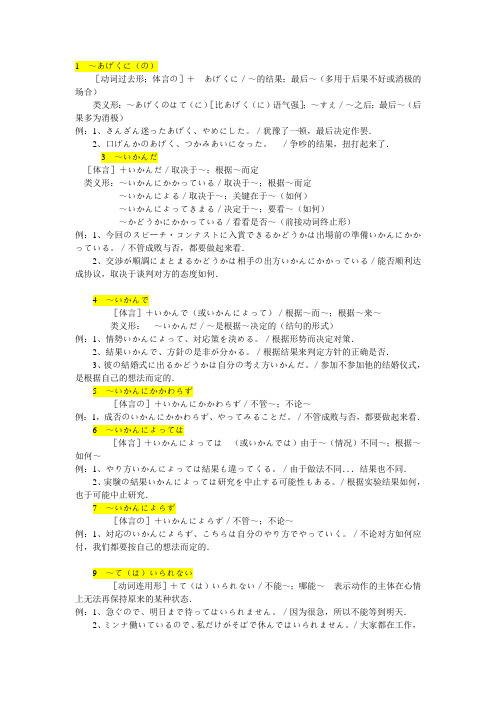
1~あげくに(の)[动词过去形;体言の]+あげくに/~的结果;最后~(多用于后果不好或消极的场合)类义形:~あげくのはて(に)[比あげく(に)语气强];~すえ/~之后;最后~(后果多为消极)例:1、さんざん迷ったあげく、やめにした。
/犹豫了一顿,最后决定作罢.2、口げんかのあげく、つかみあいになった。
/争吵的结果,扭打起来了.3~いかんだ[体言]+いかんだ/取决于~;根据~而定类义形:~いかんにかかっている/取决于~;根据~而定~いかんによる/取决于~;关键在于~(如何)~いかんによってきまる/决定于~;要看~(如何)~かどうかにかかっている/看看是否~(前接动词终止形)例:1、今回のスピーチ・コンテストに入賞できるかどうかは出場前の準備いかんにかかっている。
/不管成败与否,都要做起来看.2、交渉が順調にまとまるかどうかは相手の出方いかんにかかっている/能否顺利达成协议,取决于谈判对方的态度如何.4~いかんで[体言]+いかんで(或いかんによって)/根据~而~;根据~来~类义形:~いかんだ/~是根据~决定的(结句的形式)例:1、情勢いかんによって、対応策を決める。
/根据形势而决定对策.2、結果いかんで、方針の是非が分かる。
/根据结果来判定方针的正确是否.3、彼の結婚式に出るかどうかは自分の考え方いかんだ。
/参加不参加他的结婚仪式,是根据自己的想法而定的.5~いかんにかかわらず[体言の]+いかんにかかわらず/不管~;不论~例:1,成否のいかんにかかわらず、やってみることだ。
/不管成败与否,都要做起来看.6~いかんによっては[体言]+いかんによっては(或いかんでは)由于~(情况)不同~;根据~如何~例:1、やり方いかんによっては結果も違ってくる。
/由于做法不同...结果也不同.2、実験の結果いかんによっては研究を中止する可能性もある。
/根据实验结果如何,也于可能中止研究.7~いかんによらず[体言の]+いかんによらず/不管~;不论~例:1、対応のいかんによらず、こちらは自分のやり方でやっていく。
日语语法大全整理笔记

日语语法大全整理笔记日语作为一门复杂的语言,其语法规则也是相当丰富多样的。
在学习日语的过程中,掌握好日语的语法规则对于提高语言水平至关重要。
因此,我整理了一份日语语法大全的笔记,希望能够帮助大家更好地学习和掌握日语的语法知识。
一、名词。
名词在日语中有单数和复数之分,而且还有专门的量词用来计量不同的物品。
另外,名词还可以通过添加“の”来表示所有格,或者通过添加“が”、“を”、“に”等助词来表示不同的语法功能。
二、形容词。
日语的形容词有两种形式,一种是以“い”结尾的形容词,另一种是以“な”结尾的形容词。
形容词在句子中的位置和用法也有一定的规则,需要我们进行逐一学习和掌握。
三、动词。
日语的动词有五种基本形式,分别是未然形、连用形、终止形、连体形和已然形。
而且不同类型的动词还有不同的变化规则和用法,需要我们花费更多的时间和精力去学习和理解。
四、助动词。
助动词在日语中有着非常重要的作用,它可以用来表示时态、语气、态度等。
在句子中的位置和搭配也有一定的规则,需要我们进行反复的练习和应用。
五、副词。
副词在日语中可以用来修饰动词、形容词或者其他副词,它的位置和用法也需要我们进行系统的学习和掌握。
六、连词。
连词在日语中用来连接不同的句子成分,或者连接并列的词语。
不同类型的连词有着不同的用法和搭配,需要我们进行详细的了解和运用。
七、句型。
日语中有着丰富多样的句型,包括陈述句、疑问句、祈使句、感叹句等。
每种句型都有着特定的语法规则和用法,需要我们进行大量的练习和模仿。
以上就是我整理的日语语法大全笔记,希望能够对大家的日语学习有所帮助。
在学习日语的过程中,我们需要不断地积累和总结,才能够更好地掌握日语的语法规则。
希望大家能够坚持不懈地学习,相信通过努力一定能够取得更大的进步!。
日语语法的学习归纳

第一部分日语语法的学习归纳第一章日语的概述第二章日语的音形意第三章日语的词性和分类第一节名词表示人和事物。
它没有活用,后面可以接续格助词。
指人名和地名一般叫做固有名词。
有些名词“今日”、“毎日”等的语法作用与副词相接近,其后面可以连接格助词时叫做时间名词。
时间名词可分为以下3种。
后面不接“に”的,接“に”的和可接可不接“に”的。
“はず”,“よう”,“つもり”,“こと”,“もの”,“わけ”,“ついで”,“ため”等几乎没有实质性语义,一般伴随着修饰语出现在句子当中。
这些词叫做形式名词。
其中“よう”和“こと”有时可以单独使用,很接近于名词。
相对而言,形式名词以外的其他名词叫做实质名词。
把所有的名词还可分为友情名词和无情名词。
第二节代词在语法性质上是与名词一样的。
但它在说话人和听话人的相对关系上指事物的时候与名词不同。
代词里还有“こ,そ,あ”系列的指示代词“これ,それ,あれ,どれ”,“ここ,そこ,あそこ,どこ”和“私”,“彼”,“彼女”等人称代词。
第三节连体词原来是活用词的连体形和词组演变过来的句子成分。
它是独立词,没有活用。
总是修饰体言(名词)。
其词尾一定是“た”,“な”,“が”,“の”,“る”5个当中的一个。
第四节数词代表数字。
数字后面带有量词时叫做数量词。
表示时间的词有时候被用作象个副词,其后面可以接格助词。
它的语法功能如同名词。
这种词叫做时间名词。
数词也跟名词一样没有活用。
第五节动词可以单独使用,也可以单独成为谓语。
其词尾发生变化(活用)。
关于动词的活用在另一个题目里做具体的解释。
第六节形容词表示感情,感觉和事物的状态。
其词尾发生变化。
它修饰名词时词尾是日本语假名的“イ”。
因此叫做イ形容词。
形容词不但可以修饰名词,还可以在句子的末尾等起叙述主语性质的作用。
它还有修饰动词的作用。
修饰动词时的形态很像副词。
但是在日本语语法里把它看作是形容词的一种活用形。
第七节日本语的形容词原来不太发达。
为了补充这个缺点产生的句子成分就是形容动词。
- 1、下载文档前请自行甄别文档内容的完整性,平台不提供额外的编辑、内容补充、找答案等附加服务。
- 2、"仅部分预览"的文档,不可在线预览部分如存在完整性等问题,可反馈申请退款(可完整预览的文档不适用该条件!)。
- 3、如文档侵犯您的权益,请联系客服反馈,我们会尽快为您处理(人工客服工作时间:9:00-18:30)。
七年级英语
语法
一. 名词所有格
名词如要表示与后面名词的所有关系,通常用名词所有格的形式,意为"……的"。
一般有以下几种形式:(1). 一般情况下在词尾加"'s"。
例如:
Kate's father Kate的爸爸
my mother's friend 我妈妈的朋友
(2). 如果复数名词以s结尾,只加"'"。
例如:Teachers' Day 教师节
The boys' game 男孩们的游戏
(3). 如果复数名词不以s结尾,仍加"'s"。
例如:Children's Day 儿童节
Women's Day 妇女节
(4). 表示两个或几个共有时,所有格应加在后一个名词上。
例如:
Lucy and Lily’s mother 露茜和莉莉的妈妈(共同的妈妈,一个妈妈)
表示两者各自拥有时,要在每个名词后加’s
Lucy’s and Kate’s rooms 露茜和凯特的房间(各自的房间,两间房子)(5).动物和无生命事物的名词的所
有格一般不在词尾加"'s",而常常用介词of的短语来表示。
a map of China 一幅中国地图
the name of her cat 她的猫的名字
a picture of my family 我的家庭的一张照片
the door of the bedroom 卧室的门
二. 祈使句
祈使句主要用来表示说话人的请求、命令、建议、叮嘱等意图。
祈使句一般不用主语,读时用降调。
为使语气委婉、礼貌,常在句首或句尾加please 。
在句尾时,please前多用逗号。
(1). 祈使句肯定形式的谓语动词一律用动词原形。
Go and see. 去看看。
e in, please. 请进。
(2). 祈使句的否定形式常用don't于句首。
Don't look at your books. 不要看书。
Don't play on the road. 不要在马路上玩。
三. There be 的句子结构
There be是一个"存在"句型,表示"有"的意思,
肯定句的形式为:There be + 名词(单数或复数)+地点状语或时间状语。
be动词单复数的确定,看be后边第一个名词,当所
接主语为单数或不可数名词时,be动词形式为is;当所接主语为复数名词时,be动词为are;当be动词后接两个以上主语时,be动词与最临近主语保持数上的一致。
意思为"某地有某人或某物"。
如:
There is an eraser and two pens on the desk. 桌子上有一块橡皮和两支钢笔。
There are two pens and an eraser on the desk. 桌上有两支钢笔和一块橡皮。
(1)there be的否定句,即在be的后面加上not。
否定形式为:There be + not + (any) + 名词+地点状语。
There is not any cat in the room. 房间里没猫。
There aren't any books on the desk. 桌子上没书。
(2)there be句型的疑问句就是将be提到句首:Be there + (any) +名词+地点状语?肯定回答:Yes, there is / are. 否定回答:No, there isn't / aren't. ---Is there a dog in the picture? 画上有一只狗吗?---Yes, there is. 有。
---Are there any boats in the river? 河里有船吗?---No, there aren't. 没有。
(3)特殊疑问句:How many . . . are there (+地点状语)?"某地有多少人或物?"回答用There be . . .
There's one. / There are two / three / some . . .
有时直接就用数字来回答。
One. / Two . . .
---How many students are there in the classroom? 教室里有多少学生?
---There's only one. / There are nine. 只有一个。
/有九个。
(4)如果名词是不可数名词,用:How much + 不可数名词+ is there + 地点状语?
How much water is there in the cup? 杯中有多少水?
How much food is there in the bowl? 碗里有多少食物?
四.名词复数
(一)规那么的:
1.加s:maps bags cars
2.以s, x, sh, ch结尾的加es:
buses, boxes, fishes. Watches
3.以ce,se,ze,(d)ge结尾的直接加s:oranges
4.以o结尾的:
无生命的加s: photos kilos(千克)
有生命的加es:tomatoes potatoes
5.辅音y结尾的,变y为i加es:
Families, babies, dictionaries ,cities
(二)不规那么的:
1.man-men,woman-women,knife-knifes
policeman-poliocemen , child-children
foot-feet, tooth-teeth
a sheep-two sheep a deer-many deer
2.表示民族的词:
a Japanese/Chinese-twoJapanese/Chinese
3.俄美德意(印)澳,加上“s”莫忘掉
Russians Americans Germans Italians Indians Australians
4.大傻瓜,是英法,a变e来也不怕Englishman-Englishmen Frenchman-Frenchmen
五. 一般现在时
(一)一般现在时的含义:
(1)表示现在的状态。
①表示现在的状态。
例如:Jack is thirteen years. 杰克13岁
②表示经常的或习惯性动作。
例如:He has eggs and milk for breakfast.
他以鸡蛋和牛奶作为早餐。
③表示主语具备的性格和能力等。
例如:She likes fish very much.她很喜欢吃鱼。
(2) 一般现在时的肯定句
①句子的谓语部分由be或实义动词来充当,有时需要根据主语的人称或数进行变化。
例如:I am a student.我是个学生。
(谓语be用am)She likes noodles a lot.她很喜欢吃面条。
(谓语用实义动词like的第三人称单数形式)
②一般现在时的句子,如果主语为第三人称单数,那么动词也要相应地用第三人称单数,be的第三人称单数形式为is。
例如:His father works in a school.。
